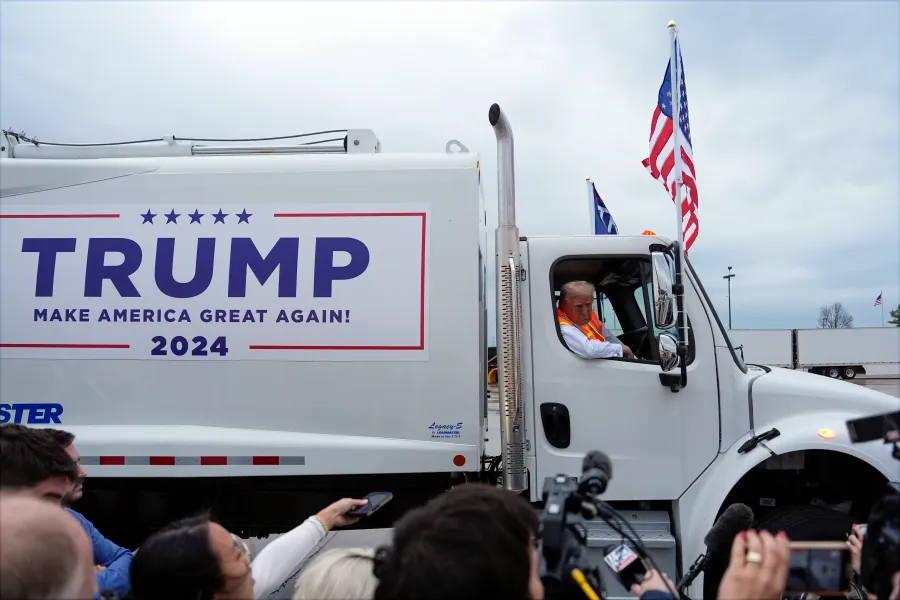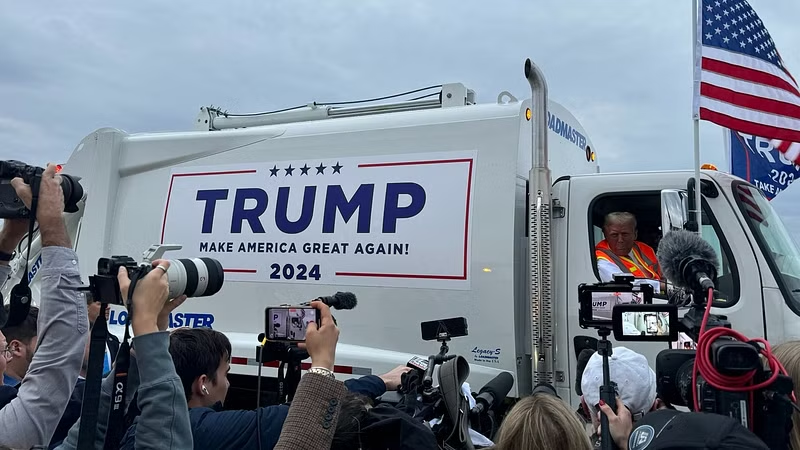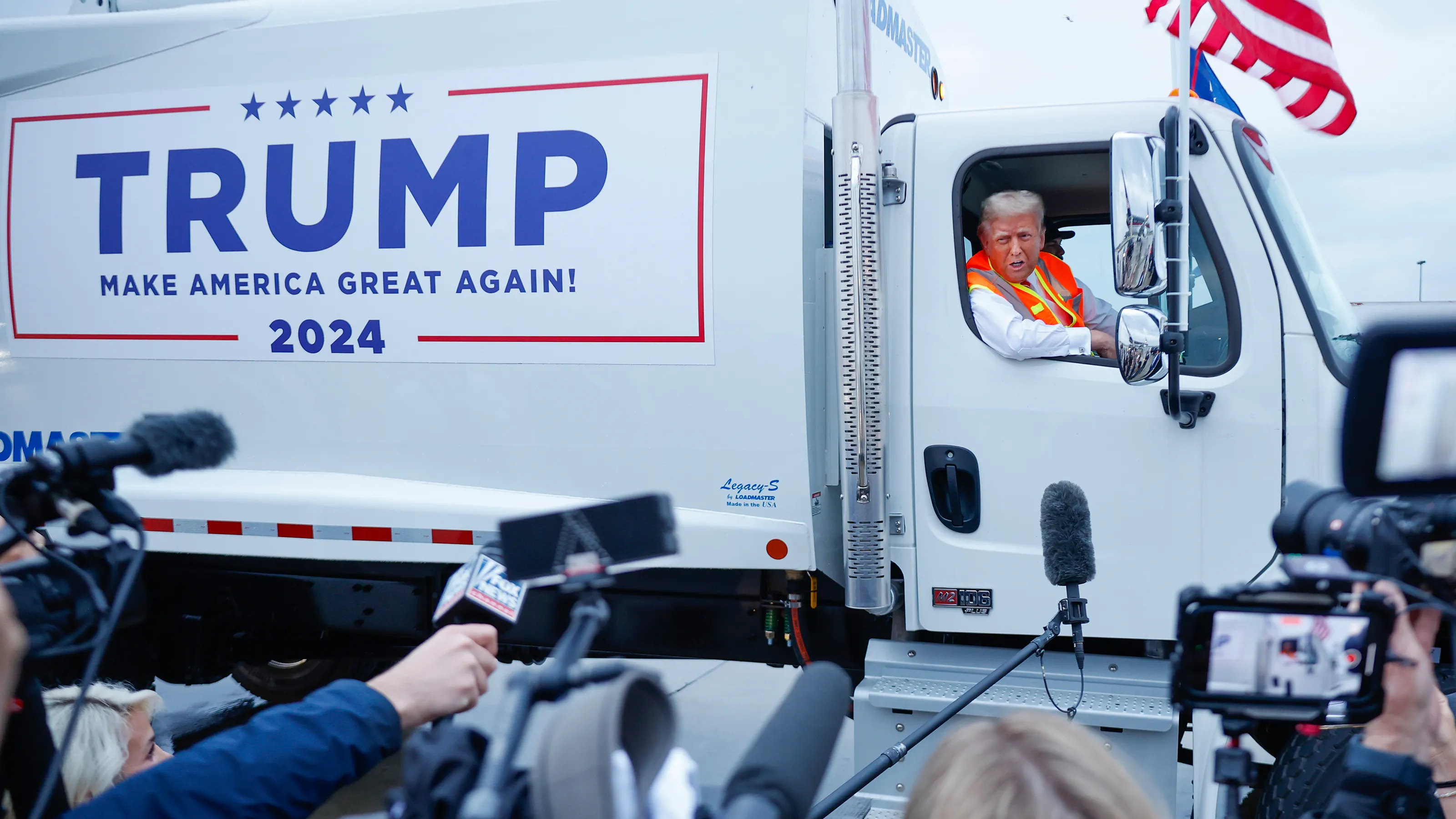Trump Rides Garbage Truck After US President Biden Calls His Supporters ‘Garbage’. The U.S. political stage has seen another high-profile clash as President Joe Biden tried to clarify a comment perceived as an insult to former President Donald Trump’s supporters, referring to “garbage.” This incident echoes past controversies and draws parallels with the “basket of deplorables” remark made by Hillary Clinton during Trump’s 2016 campaign.
As the controversy unfolds, Biden’s team, including Vice President Kamala Harris, has worked to contextualize the president’s comments, emphasizing a condemnation of specific rhetoric rather than a broad criticism of Trump’s followers.
The Origins of the Controversy: Biden’s ‘Garbage’ Comment
This episode began during a rally where comedian Tony Hinchcliffe, performing for Trump supporters, reportedly called Puerto Rico an “island of garbage,” sparking outrage from Latino communities and other groups. Biden’s initial response was, “The only garbage I see floating out there is his supporters,” a comment he later clarified.
According to the White House, the president intended to call out the rhetoric used by some at Trump’s rally rather than labeling all Trump supporters as “garbage.” The administration’s clarification stated that Biden’s use of the term “supporter’s” aimed to emphasize the specific language from the Trump event rather than millions of individual Trump backers.
Read : World’s Most Accurate Economist Predicts Donald Trump Win in US Election
The comment led to a Republican backlash, as Trump supporters claimed Biden had disparaged them, evoking memories of the divisive language often associated with past political rifts. Biden, speaking to Voto Latino, later underscored his disapproval of the rhetoric used to criticize Puerto Rico, labeling it as “un-American.”
Read : Why Trump Supporters Are Wearing Diapers at Rallies?
He explained that his intent was to denounce the inflammatory language rather than generalize Trump’s supporters, as confirmed by White House Press Secretary Karine Jean-Pierre. She reiterated that Biden “does not view Trump supporters or anybody who supports him, as garbage,” stressing the president’s longstanding advocacy for civil discourse.
Political Fallout and Comparisons to Clinton’s ‘Deplorables’ Comment
This political confrontation hearkens back to Hillary Clinton’s controversial “basket of deplorables” remark from 2016, where she categorized half of Trump’s supporters in a similar light, a comment that haunted her campaign and fueled Trump’s supporters.
Trump and his base quickly latched onto Biden’s “garbage” remark as another example of Democratic disdain toward a large swath of Americans, amplifying the perception of an elitist dismissal of their values.
Trump himself seized upon Biden’s comments during a rally in North Carolina, suggesting that calling supporters “garbage” was a more offensive comment than Clinton’s. Echoing themes of his 2016 campaign, he emphasized the importance of his supporters as “the heart and soul of America.”
This narrative, alongside a pointed remark about Biden’s “garbage” reference, has re-energized Donald’s base, who interpret the comment as a validation of their belief that they are targeted and marginalized by the current administration.

The political and social impact of these comments has extended beyond the White House. Biden’s statements drew immediate backlash from several Republican leaders, many of whom demanded an apology. Latino Republicans, in particular, voiced their anger, noting that the tone and content of the Trump rally had already fueled concerns about the GOP’s relationship with Latino communities.
Puerto Rican leaders expressed disappointment in Trump’s apparent endorsement of the rally comments, viewing his lack of censure for the inflammatory language as an endorsement of harmful stereotypes against Puerto Ricans and other Latino groups.
Kamala Harris’s Response and the Broader Context of Division in American Politics
Vice President Kamala Harris has also weighed in on the controversy, attempting to redirect focus toward her campaign’s platform. Harris, who is now running as the Democratic presidential candidate after Biden’s early exit, sought to address the controversy head-on, stating that Biden had already clarified his comments.
Harris argued against using criticism based on whom people choose to support politically, underlining her disapproval of divisive rhetoric from both sides.
In her recent campaign rally in Washington D.C., Harris underscored her vision for America, expressing the need to “turn the page on the drama and the conflict” in American politics. She emphasized a future-focused agenda centered on unification rather than divisive language, with the promise to bridge the divide within American society.
Harris’s rally was held in a particularly symbolic location, the spot where former President Trump addressed his supporters just before the January 6 Capitol riots in 2021, which added a weight of historical significance to her call for harmony and unity.
Trump, on the other hand, defended the Madison Square Garden event as a “lovefest,” insisting that it was merely a gathering of people who are passionate about their beliefs. He acknowledged that while “somebody said some bad things,” he did not consider it a significant issue. His response has resonated with his supporters, who see his stance as standing firm in defense of their values and opposing what they perceive as elitist dismissal from Democratic leaders.

Meanwhile, public reactions from the Puerto Rican community in key battleground states, such as Pennsylvania, illustrate the sensitivity surrounding the rally comments. With a population of 90,000 Puerto Ricans in Philadelphia alone, these voters are likely to remember the comedian’s remarks as well as Trump’s response in the coming elections.
Though residents of Puerto Rico are unable to vote in presidential elections, the Puerto Rican diaspora in the U.S. holds significant voting power, particularly in swing states where they could potentially influence the outcome.
Biden and Trump’s Path Forward: A Nation Divided Over Language and Loyalty
This recent incident further underscores the polarization within the United States and the difficulty of maintaining civil discourse in a hyper-partisan era. With Biden’s comment sparking such outrage, both sides seem set on using inflammatory language to stoke their respective bases.
The Republicans’ swift response to Biden’s “garbage” remark reveals a deep-seated frustration with how they perceive themselves to be regarded by Democratic leaders. In contrast, Democrats, who often focus on the potential harm of Trump’s rhetoric, seek to defend Biden’s comment as a defense of decency rather than an attack on individuals.
As the campaign trail continues, the Biden-Harris ticket faces the challenge of balancing condemnation of harmful rhetoric while avoiding the alienation of Trump’s vast voter base. For Trump, this incident serves as an opportunity to reinforce his narrative of “us versus them,” a strategy that helped him solidify his position in 2016 and continues to resonate with his base.
Trump has turned the phrase into a rallying cry, leveraging Biden’s comment as a badge of honor. His campaign and supporters are working to redefine the term, taking it from an intended insult to a symbol of pride. In so doing, they not only reassert their identity as politically distinct from Democrats but also defy what they see as elite condescension.
With the nation closely watching, Biden, Harris, and Trump are navigating an increasingly complex political landscape. Their responses will not only define their campaign strategies but also reflect broader American sentiments. This latest controversy, whether it fades or remains in the spotlight, is a telling example of how language continues to be weaponized in the battle for American hearts and minds.

